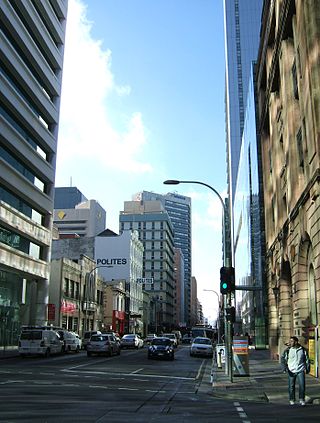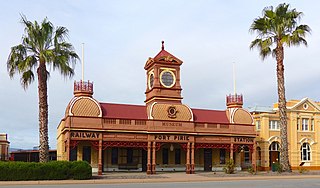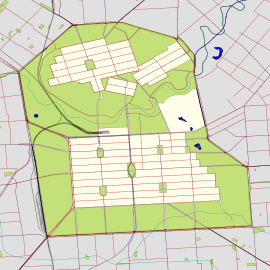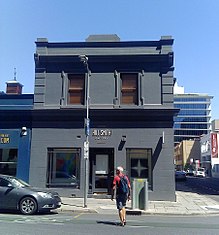
Port Pirie is a small city on the east coast of the Spencer Gulf in South Australia, 223 km (139 mi) north of the state capital, Adelaide. Port Pirie is the largest city and the main retail centre of the Mid North region of South Australia. The city has an expansive history which dates back to 1845. Port Pirie was the first proclaimed regional city in South Australia, and is currently the second most important and second busiest port in SA.

The pie floater is an Australian dish sold in Adelaide. It consists of a meat pie in a thick pea soup, typically with the addition of tomato sauce. Believed to have been first created in the 1890s, the pie floater gained popularity as a meal sold by South Australian pie carts. In 2003, it was recognised as a South Australian Heritage Icon.

Adelaide railway station is the central terminus of the Adelaide Metro railway system. All lines approach the station from the west, and it is a terminal station with no through lines, with most of the traffic on the metropolitan network either departing or terminating here. It has nine below-ground platforms, all using broad gauge track. The station is located on the north side of North Terrace, west of Parliament House.

North Terrace is one of the four terraces that bound the central business and residential district of Adelaide, the capital city of South Australia. It runs east–west along the northern edge of "the square mile". The western end continues on to Port Road and the eastern end continues across the Adelaide Parklands as Botanic Road.

King William Street is the part of a major arterial road that traverses the CBD and centre of Adelaide, continuing as King William Road to the north of North Terrace and south of Greenhill Road; between South Terrace and Greenhill Road it is called Peacock Road. At approximately 40 metres (130 ft) wide, King William Street is the widest main street of all the Australian State capital cities. Named after King William IV in 1837, it is historically considered one of Adelaide's high streets, for its focal point of businesses, shops and other prominent establishments. The Glenelg tram line runs along the middle of the street through the city centre.
Kent Town is an inner suburb of Adelaide, South Australia. It is located in the City of Norwood Payneham & St Peters local government area.

Thebarton, formerly Theberton, on Kaurna land, is an inner-western suburb of Adelaide, South Australia in the City of West Torrens. The suburb is bounded by the River Torrens to the north, Port Road and Bonython Park to the east, Kintore Street to the south, and South Road to the west.

Until 1958, trams formed a network spanning most of Adelaide, South Australia, with a history dating back to 1878. Adelaide ran horse trams from 1878 to 1914 and electric trams from 1909, but has primarily relied on buses for public transport since the mid-20th century. Electric trams, and later trolleybuses, were Adelaide's main method of public transport throughout the life of the electric tram network. The tram network was progressively closed down through the 1950s with the last lines closing in 1958; the Glenelg tram line was the only line to survive these closures and has remained in operation ever since and has been progressively upgraded and extended since 2005.

Glenelg East is a residential suburb 9 kilometres (5.6 mi) south-west of the centre of Adelaide, South Australia. It is characterised by quarter-acre blocks with heritage homes and parks intermingled with contemporary modern homes and low-rise multi-dwelling units.

Thomas English was a leading colonial architect in South Australia, Mayor of Adelaide (1862–1863), and a member of the South Australian Legislative Council 1865–1878 and 1882–1884.

Grenfell Street is a major street in the north-east quarter of the Adelaide city centre, South Australia. The street runs west-east from King William Street to East Terrace. Its intersection with Pulteney Street is formed by Hindmarsh Square. On the west side of King William Street, it continues as Currie Street towards West Terrace.

Waymouth Street, often spelt as Weymouth Street in the early days, is an east–west street running between King William Street and West Terrace in the Adelaide city centre in South Australia. The street is named after Henry Waymouth, a founding director of the South Australian Company, whose name was also sometimes spelt as Weymouth.

Timothy Peter Jenkin is a South African writer, anti-apartheid activist and former political prisoner. He is best known for his 1979 escape from Pretoria Local Prison, along with Stephen Lee and Alex Moumbaris.

North Adelaide is a predominantly residential precinct and suburb of the City of Adelaide in South Australia, situated north of the River Torrens and within the Adelaide Park Lands. Laid out in a grid plan in three sections by Colonel William Light in 1837, the suburb contains many grand old mansions.

George Klewitz Soward was an architect and politician in South Australia. he was a partner in the firm English & Soward from 1880 to 1925, renamed English, Soward & Jackman from 1926 to 1936. Among other buildings, the firm was known for designing Beehive Corner, the Epworth Building, and the Queen Adelaide Club.

Ellen Street railway station was the second of six stations that operated successively between 1875 and the early 2010s to serve the rural maritime town of Port Pirie, 216 km (134 mi) by rail north of Adelaide, South Australia. Soon after construction of the line towards Gladstone began in 1875, an impromptu passenger service commenced. The inaugural station, Port Pirie South, was 800 metres from the centre of the town. Since two tracks had already been laid down the middle of Ellen Street to the wharves, a small corrugated iron shed was erected as a ticket and parcels office. The street-side location was unusual for the South Australian Railways. In 1902, when passenger traffic had increased greatly, a stone building was erected in a striking Victorian Pavilion style. After the tracks were removed in 1967 and the station closed, the building's design assured its retention as a museum of the National Trust of South Australia.
The Pirie Street Brewery was a brewery situated on Pirie and Wyatt Streets, Adelaide, in the early days of the British colony of South Australia. It was succeeded on the same site after a few years by the Adelaide Brewery. Its original address was 50-62 Wyatt Street; today the buildings at 54–60 are heritage-listed in the South Australian Heritage Register, and there is a remaining building at 113 Pirie Street now occupied by the Hill Smith Gallery.

Escape from Pretoria is a 2020 Australian prison film co-written and directed by Francis Annan, based on the real-life prison escape by three political prisoners in South Africa in 1979, starring Daniel Radcliffe and Daniel Webber. It is based on the 2003 book Inside Out: Escape from Pretoria Prison by Tim Jenkin, one of the escapees.
Stephen Bernard Lee is a South African former political prisoner best known for his 1979 escape from Pretoria Local Prison with friend and fellow activist Tim Jenkin and a third inmate, Alex Moumbaris.
Ozone Theatres Ltd, formerly Ozone Picture Company and then Ozone Amusements Ltd, was a cinema chain based in Adelaide, South Australia, from 1911 until 1951, when it sold its theatres to Hoyts. It was founded by Hugh Waterman and friends, and was jointly run by him and seven sons, including Clyde Waterman and Sir Ewen McIntyre Waterman. S.A. Theatres and Ozone Theatres were subsidiary companies, and the chain was referred to as the Ozone circuit. It was one of two major film exhibitors in the state from after World War I until the late 1940s, the other being D. Clifford Theatres Limited. After 1938, Ozone dominated the market.




















